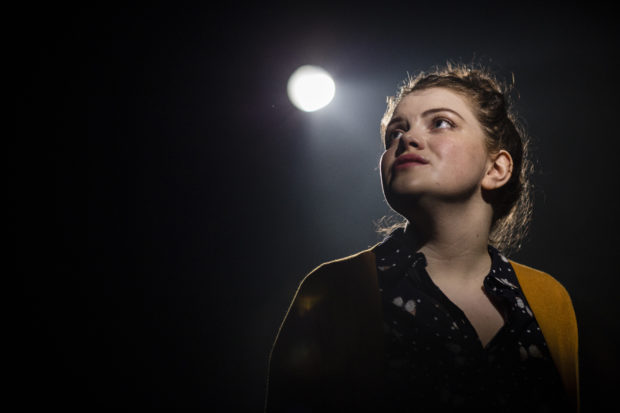You have no items in your cart. Want to get some nice things?
Go shopping
Monologues seem to have become Philip Ridley’s form of choice. We last saw the trend-setting playwright at Shoreditch Town Hall with Killer, an anthology of three monologues performed by Yerma’s John MacMillan. Now fans of Ridley’s surreal and twisted worldview have been served up another taster menu of bite-sized monologues. While it’s not enough to sate my hunger for the more substantial offering of a full-length play, these six short pieces are Ridley at his most experimental and free-wheeling.
Our performers are Tyrone Huntley, who has graced the West End in Jesus Christ Superstar and The Book of Mormon, and Georgia Henley, best known as Lucy Pevensie in The Chronicles of Narnia. They’re two people you’d never expect to crop up in a Philip Ridley play, but it’s an inspired piece of casting. The anthology shows off both actors’ astonishing range and demands performances of visceral power. Henley in particular really lets loose, delivering both delicate characterisation and deep pain.
The gimmick is that the monologues are written as gender-neutral, so on alternating nights audiences can see Huntley and Henley perform different monologues. These alternative versions are billed as “She follows him” and “He follows her”; I saw “She follows him”. Surprisingly, this format really adds to the piece. Not only did it leave me desperate to go and see Huntley perform Henley’s monologues and vice versa, but it brought questions of gender and sexuality to the fore.
Take ‘Bloodshot’, the tale of an impromptu sexual encounter in the bushes between the speaker and a boy with a bewitching bloodshot eye. I saw it performed by Huntley. His buttoned-down, pernickety protagonist is haunted by his first sexual experience with a man, seeming to sleepwalk into it and never really acknowledging his supressed desires. The monologue, however, was originally written for a woman; an earlier version was part of Ridley’s Vault Zero monologues. If I were to see Henley in the role, her later discomfort would make me question if she were somehow forced into the act. Are my differing responses the result of ingrained gender stereotypes? It’s this kind of thinking that Ridley looks to challenge.
‘Bloodshot’ is one of the stronger monologues of the six. Though the anthology is often daringly experimental, many of the pieces are not vintage Ridley. Opener ‘Angry’ feels like theatrical throat-clearing, an insistently meta exercise in which Huntley works himself into a fury for being placed onstage with no story to tell and the audience eyeballing him from all sides of the in-the-round setting. ‘Okay’ sees Henley frenetically reel off a self-help style speech (“I’ve got to change my whole attitude towards opportunity”) to the nauseating tap of her rapidly pacing feet. You have to admire it technically; but it’s difficult to love. ‘Dancing’ seems to have been written as a joke, a grisly and surreal story delivered deadpan by Henley as a buoyant party girl.
Ridley is clearly enjoying himself, and there’s pleasure to be had in his liberty to experiment in short-form pieces. Moving through the anthology feels like heading down the rabbit hole into the playwright’s characteristically twisted world. The subject matter gets increasingly strange; Cassie Mitchell’s fantastic lighting design gets bolder and bolder; and the audience are invited to exercise their imaginations in creating Ridley’s post-apocalyptic worlds. Conversely, the monologues seem to get more traditional in from and structure. The closing monologue ‘Air’, the longest and most satisfying offering, has a clear narrative and naturalistic characterisation. It doesn’t push the monologue form as far as the other pieces, but while its form is relatively restrained Ridley fully exercises his talent for bizarre and arresting imagery.
‘Air’ begins with the protagonist (Henley) caught in the sinking wreck of a refugee ship. It imagines what would happen if a recognisable world of antique bookshops and swimming lessons was torn apart by racial violence and bloody civil war. Its message is clear: we may turn our backs on Syrian refugees, but look how easily we too could be tightly stuffed into a boat that will never reach its destination. The piece’s brutality reminded me of Alfonso Cuarón’s Children of Men, but it’s all the more heart-breaking because of the sweet romance which precedes the violence. The language is remarkably beautiful. As Henley’s love interest approaches, she says: “I feel the heat. What’s he made of? Molten lava?” Even the tiniest of touches – like a parent suffering from dementia whose eyes “flash neon” when a photo album revives lost memories – are unbelievably moving. This is Ridley at his best and a fitting end to the anthology.
The pieces in Angry are like steroid shots in the arm, brief flashes of a hyperreal world which shows how easily things can fall apart. Ridley’s characteristic themes are all here: nostalgia, imagination, and violence. Yet, as with Killer, at least half of these monologues will be familiar to Ridley devotees. ‘Angry’, ‘Now’ and ‘Bloodshot’ are updated versions of Ridley’s Vault Zero monologues. ‘Air’ is a virtuosic demonstration of how current Ridley’s writing can be. Theatre needs another long-form play from perhaps its most distinctive living playwright. Philip, if you’re reading this, get writing!
Angry continues at the Southwark Playhouse until March 10.

About Simon Fearn
Simon is a student at Durham University and aspiring theatre critic. He has reviewed at the Edinburgh Fringe with EdFringeReview and is Stage Editor for Durham's student newspaper, Palatinate. He has also written music reviews for W!zard Radio and Cuckoo Review.




